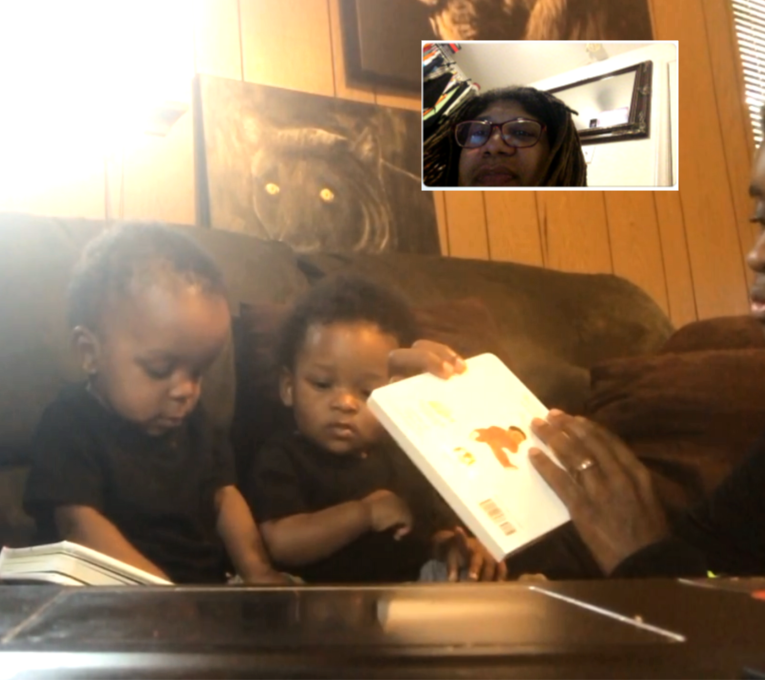Book Babies Launches Virtual Visits to Continue to Meet the Needs of Families
By Jeanna Baxter White
Although Book Harvest’s Book Babies team can’t visit families in person right now, that doesn’t mean they’re not keeping in touch, shared Ginger Young, the Durham-based organization’s founder and executive director.
Launched in Durham County in 2013, this groundbreaking evidence-informed home visiting program provides 20 new age-appropriate books to participating children every year starting at birth, ensuring that they have a home library of more than 100 books by the time they start kindergarten. Home visitors from Book Babies partner with the parents of 376 enrolled children ages 0 to 5 in two locations in North Carolina: Durham County and Forsyth County. Together, Book Babies parents and home visitors set literacy goals for each enrolled child, mark their progress as they prepare for school, and help ensure that the entire family starts kindergarten ready to learn.

These collaborative activities have always taken place in families’ living rooms and at their kitchen tables. But in March, as concerns about the coronavirus began to spread across the country, Young and her Book Babies colleagues realized that they needed to find another way to provide their services.
On Friday, March 13, the same day that the Mayor of Durham issued a state of emergency declaration for the city, the Book Babies team wrote the protocols and curriculum for virtual home visits. The first virtual home visit occurred only three days later.
Adapting to Meet the Needs
Since March 16, the Book Babies team has completed 84 virtual home visits, using a variety of different platforms, including Zoom, FaceTime, Facebook Messenger, WhatsApp, and phone calls.
During the transition to virtual visits, team members also called every current Book Babies family, as well as the 59 alumni/ae of the program, to ask them two questions: “How are you and your family doing?” and, “What do you need right now?”
“This process helped us gather information about our families’ basic needs,” said Young. “We discovered that for at least 10 to 20 percent of our families, some aspects of connectivity are a challenge, which means we have families who are unable to conduct a virtual visit. And more than that, there are older children in the household who are unable to connect to online learning opportunities.”
Young acknowledges that the program is “living a beta test right now.” Of course, Book Babies is not the only program that was thrust into a virtual world without the benefit of time to research and develop best practices; many organizations have spent the past few months scrambling to figure out how to continue to support children and families during the pandemic.

Latasha McKenzie 
Gabriel 
Amir 
Eli & Evin
The Silver Lining – Opportunity
“It’s not just us; a lot of visiting programs are doing the same thing. I think it is fascinating to see how we are each adapting day to day, week to week, and incorporating improvements as we go. Ten weeks after we transitioned to virtual visits we are still using parent feedback each week to refine and to change based on the needs of our families.”
“If there is a silver lining to this terrible time we are in, it’s that we are getting the opportunity to ask some of the tough questions we’ve always known that we needed to ask,” Young mused. “The pandemic has presented us with a call to action. We’ve had the opportunity to step up and to be very nimble with these tools and open to learning new things for the sake of families whose success we are committed to.”
She referenced the comprehensive North Carolina Early Home Visiting Landscape Analysis released by the UNC School of Social Work’s Jordan Institute for Families in 2018, which revealed that there is a vast untapped need for home visiting in our state. According to the analysis, only 1% of the families who could benefit from home visits in the early childhood phase are getting them. “By redefining home visiting to include virtual interventions, we could possibly take that 1% to 10% because of the ability to reach a greater caseload,” suggested Young. “Potentially, for the same amount of money, all of us in this field could go further and provide the benefits of home visiting to exponentially more families.”
While the transition to virtual home visits is very much a learning process, the Book Babies team reports that it is seeing good results so far. “I have absolutely loved doing virtual visits!” shared Book Babies home visitor Kenitra Williams. “It has been a wonderful opportunity to see families during this time of staying at home. I have continued to be able to check in with caregivers to talk about how reading is going and discuss possible solutions to any reading struggles that they may have.
“I think caregivers have enjoyed sharing the milestones their children have reached and knowing that they have someone to brainstorm with them possible solutions to problems and to share ideas,” Williams continued. “The children enjoy participating in the call and some are excited that I have some of the same books they do. For those 30-45 minutes, I think all of us appreciate the opportunity to focus on their child and reading — a break from the craziness that is the rest of the world right now.”
Young explained that she believes the transition to virtual home visits is working because the Book Babies program was built on a deep commitment to meeting parents where they are. Over the past six years, Book Babies home visitors have done their work sitting on families’ couches, holding their babies at their kitchen tables, and engaging with them in the place where they are most comfortable: their homes. Virtual home visits became the logical next iteration of the program at a time when families are unable to welcome visitors into their homes in person.
The Transition is Working Due to Relationships
“Even before the pandemic we were conducting home visits on the parents’ terms,” explained Young. “The good news is that we have been able to deliver this collaboration and to continue promoting pathways to kindergarten readiness even during a pandemic when we can’t sit side by side. Our pre-existing relationships of trust will carry us all through this challenging time. We are still telling parents, ‘We really want to connect with you, do a check-in on your child’s literacy progress and find out how you are feeling and what you need.’ Going into this virtual adaptation, we already had the infrastructure in place to communicate with families in the ways they preferred.”
Book Babies Team Leader Meytal Barak notes that virtual home visits are fundamentally different than in-person visits. “If we don’t let go of the notion that a virtual visit is the same as an in-person home visit, then we will definitely have a tougher road. There are some benefits to virtual that we can’t get in person and vice versa. It’s not that one replaces the other. It’s simply a different way of engaging. This experience is going to leave us all better and stronger.”
You can learn more about how to enroll in Book Babies here.
The Mebane Charitable Foundation has supported Book Harvest’s Dream Big Book Drive and the Book Babies program since 2018 and appreciates the passion and vision that is making a difference in the lives of these young families and children.




Leave a Reply
Want to join the discussion?Feel free to contribute!